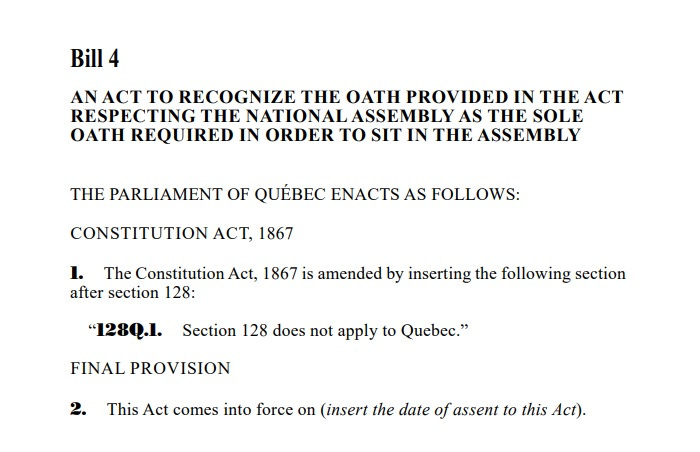More constitutional vandalism - Quebec's turn (again)
No, provinces cannot unilaterally amend the Constitution of Canada
Today Quebec tabled Bill 4, which seeks to add a provision to the Constitution Act, 1867 that declares that section 128 does not apply to Quebec. Section 128 requires all members of the House, the Senate, and all provincial legislative assemblies to take the prescribed oath of allegiance (the wording set out in the Fifth Schedule - thus making the wording itself an explicit requirement of the constitution).
Here’s the entire Bill:
This is a plainly unconstitutional attempt to unilaterally amend the national constitution. Provinces are only able to unilaterally amend their provincial constitutions, they’re not able to amend the Constitution of Canada.
The amending formula requires any changes to the Constitution of Canada affecting one or more provinces to be effected under section 43, requiring a resolution of the relevant provincial legislative assembly and the federal House of Commons and the Senate. (It’s not entirely clear that this particular change, as a provision pertaining to all legislative assemblies, doesn’t in fact require recourse to the amending formula’s more onerous general procedure - the so-called 7/50 rule requiring the House, the Senate, and at least seven provinces representing at least 50 percent of the population). But what is clear is that at the very least if Quebec wants to exempt itself from this requirement, it needs the follow the bilateral procedure’s requirements.
For a lengthy analysis of why provinces cannot unilaterally amend the Constitution of Canada, please see my paper, forthcoming in the Osgoode Hall Law Journal. This paper was written in response to Quebec’s Bill 96, passed last year, and which purports to add provisions declaring that Quebecers form a nation and that French is the only language of Quebec, but it applies with equal force to this new bill.
What is troubling is that the federal government refused to stand up for the rule of law and the Constitution when Bill 96 was introduced, and likely will sit on its hands again here. But the constitutional amending formula is not some mere technicality. It establishes the rules for who gets to change the most fundamental governing institutions, rules, and values of our society. The Constitution is higher law. To violate the amending formula is arguably the most dangerous rule of law infringement imaginable.
Very few people will be alarmed by a province wanting to get rid of an oath to a King. That’s understandable, as a matter of substance. But there’s a proper procedure for changing or repealing an explicit requirement of the Constitution. We need only to look at what Alberta’s government is attempting to see where this nonsense can lead. One would hope to see the legal community and constitutional experts much more alarmed about this.





Absolutely. Let’s get all the other provinces and territories AND First Nations to support the amendment.
Thank you, Emmett.I think that if we open the Constitution, we better be prepared for all sorts of requests for changes. The Oath can be said with fingers crossed, and nothing will happen, but if major changes are lurking in the background, and creep in, it could cause unknowable damage to Canada. An incredible opportunity for public education.